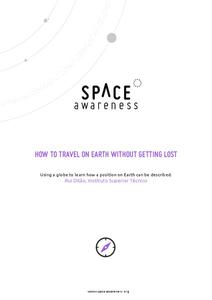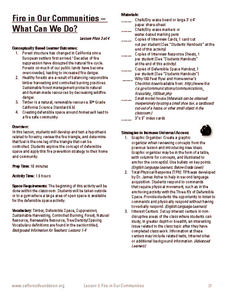Berkshire Museum
Backyard Rocks
You don't have to travel far to learn about rocks, just step outside, pick up a stone, and begin investigating. After taking a class walk around the school grounds collecting rocks, young scientists practice their skills of observation...
Curated OER
habitat Powerpoint Project and Webquests
Using a provided PowerPoint template and a list of relevant web sites, 4th graders create an animal habitat presentation. This lesson includes relevant web sites, vocabulary, PowerPoint template, rubric and full lesson plan. This link is...
Curated OER
Solar Kit Lesson #3 Parts of a Solar Panel - Part I
A solar cell is similar to a rechargeable battery in many ways. Science lab groups connect each in a series circuit to run a mini motor and then compare and contrast them by answering questions and completing a Venn diagram. This is an...
TryEngineering
Graphics: Bits and Points
What can a mural teach pupils about computer science? The lesson has scholars create a mural on a wall to learn about bitmap and vector graphics. Along the way, they learn about the graphics coordinate system.
Curated OER
Dig This: A Relief Sculpture of Dinosaur Bones
This is a truly amazing project. Perfect to use during your next dinosaur unit. Second and fifth graders work together to draw and make a relief sculpture of a nine foot-long stegosaurus. They discuss what paleontologists do and then...
Curated OER
Simple Machines I - Inclined Planes, Wedges, and Screws
The principles and uses of inclined planes, screws, and wedges are the focus of a science lesson. In it, youngsters come up with every day examples of simple machines, and build an example of one in class. That project is then used to...
Micron Technology Foundation
States of Matter
Solids, liquids, gasses oh my! Young scientists will be amazed when they try this experiment, which uses dry ice to discover the states of matter through sublimation.
Scholastic
Ready to Research Owls
Researching facts about owls can be a hoot for your class. Let them wisely collaborate on this writing project. The resource is the second part of three parts. It is best to use all three lessons in order.
Curated OER
Circle of Life
Here is a well-designed science lesson that shows learners that everything that organisms do in ecosystems, including running, breathing, burrowing, growing, requires energy. After a thorough discussion of their own eating and drinking...
Berkeley Engineering and Mentors
Marshmallow Catapaults
After a brief lecture on levers, torque, projectiles, and the five-step engineering design cycle, young physical science learners or engineers build catapults out of craft sticks. This is an open-ended exploration of what works and what...
Curated OER
Roller Coasters
Twisting and turning through the sky, roller coasters are popular attractions at amusement parks around the world, but how exactly do they work? Explore the physics behind these thrilling rides with an engineering design activity....
Curated OER
Classifying Plants and Insects
Art and science come together in a lesson based on Flower Still Life by Ambrosius Bosschaert the Elder. Learners classify plants and insects in the painting by color, leaf shape, size, reproduction, and season of bloom.
Baylor College
What Is a One Part Per Million Solution?
Water may appear to be crystal clear, but there could be dissolved substances present. Lab groups make a one-part-per-million of a food coloring solution to demonstrate this concept. As part of an outstanding unit about water, this...
Baylor College
Heart and Lungs
With a partner, youngsters measure their pulse and breathing rates, both at rest and after running in place for a minute. While this activity is not novel, the lesson plan includes a large-scale classroom graphing activity and other...
Baylor College
Dust Catchers
In class, your emerging environmentalists construct dust catchers. They take them home for a week or two, and then bring them back into class to examine under a magnifier. From this activity, they learn what makes up dust and that...
Baylor College
Moving Air
In lab groups, young scientists place aluminum cans with a bubble-solution cap into different temperatures of water to see what size of bubble dome forms. As part of an atmosphere unit in preparation for learning about convection...
Curated OER
Seed to Soup Organic Garden
Have your young biologists visit decomposition stations as they explore the process of organic material. This activity involves some set-up as kids will be visiting 13 desks to collect colored paper each representing a different element...
Space Science Institute
The "All American" Eclipse Guide
Are you ready for the biggest astronomical event of the year? More importantly ... are you ready to share it with your scholars? Use a presentation filled with facts and diagrams to make sure everyone in class understands the importance...
Space Awareness
How To Travel On Earth Without Getting Lost
Have you ever wanted to travel the world? Take a virtual trip with a geography lesson that uses longitude and latitude, the position of the sun, an astronomy app, and a classroom globe.
Baylor College
How Do We Use Water?
Send youngsters home to survey how they use water in their homes. Then bring them together to discuss which uses are essential for our health and which are not. A helpful video offers teaching tips for this lesson, and a presentation...
Forest Foundation
Fire - How Does it Relate to You?
Forest fires can be a necessary step in keeping a forest healthy, but what happens when they get out of control? Learners investigate the causes and effects of forest fires in two specific areas, culminating in a report about the ways...
NEED Project
Calibrating Thermometers
Engage young scientists in the upper-elementary and middle school grades with this collection of simple experiments. Whether you're teaching about heat transfer, density, or potential energy this resource has a lab for you.
Forest Foundation
Fire in Our Communities - What Can We Do?
Learn about defensible space and renewable resources with a lesson about forest fires. After exploring the ways that humans have impacted the environment, kids conduct mock interviews about differing points of view in the conservation...
Melissa Institute for Violence Prevention and Treatment
Concept Muraling
Concept muraling helps learners improve their comprehension of a text by giving them a way to organize their understanding of the key concepts in that text. Introduce readers to this process with a carefully scaffolded lesson that models...
Other popular searches
- 4th Grade Science Project
- Physical Science Projects
- Science Project on Pulleys
- Science Project Volcano
- Science Project Gravity
- Science Project Ideas
- Forensic Science Project
- Science Fair Project Ideas
- Rock Science Project
- Science Project Food
- Science Project Terrarium
- Science Fair Project Data

























